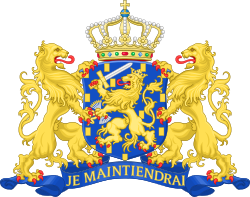| This article is part of a series on |
| Politics of the Netherlands |
|---|
 |
Partial general elections were held in the Netherlands on 12 June 1883, [1] with voters electing 43 of the 86 seats in the House of Representatives.
| This article is part of a series on |
| Politics of the Netherlands |
|---|
 |
Partial general elections were held in the Netherlands on 12 June 1883, [1] with voters electing 43 of the 86 seats in the House of Representatives.
Of the 86 seats in the House of Representatives, 8 were elected in single-member constituencies using the two-round system.
The other 78 were elected using two-round plurality block voting in 35 constituencies from 2 to 7 seats. To be elected in the first round, a candidate had to reach an electoral threshold of 50% of the number of valid votes cast, divided by the number of seats up for election in the district.
| Party | Votes | % | Seats | |
|---|---|---|---|---|
| Liberals | 45 | |||
| Anti-Revolutionary Party | 18 | |||
| Catholics | 18 | |||
| Conservatives | 5 | |||
| Total | 86 | |||
| Total votes | 75,056 | – | ||
| Registered voters/turnout | 122,399 | 61.32 | ||
| Source: Bromley & Kossman, [2] Nohlen & Stöver | ||||
Liberal Conservative Anti-Revolutionary Catholic